Library
-
Clomipramine is given by mouth and is used on and off label to treat behavior disorders such as obsessive-compulsive disorders, anxiety, aggression, and urine marking. In cats, it is used for urine spraying, and in birds, it is used to treat feather picking.
-
Clotrimazole topical is an antifungal used in the treatment of surface skin infections caused by fungal organisms in cats, dogs, rabbits, birds, reptiles, and other animals. Clotrimazole topical comes in a variety of forms that may be specially compounded and/or be combined with other medications. All forms are applied topically.
-
Colchicine is given by mouth and is used off label in dogs and birds, primarily to treat amyloidosis and Shar-Pei fever. Its use in veterinary medicine is largely experimental and its effectiveness has not been well documented. Give as directed by your veterinarian.
-
The complete blood count (CBC) assesses different parameters of the cells in the blood including total number, appearance, size, and shape. Red blood cells, white blood cells, and platelets comprise the cellular component of the blood.
-
Cryosurgery is the application of extreme cold to destroy abnormal or diseased tissue. In animals, the technique is used to treat tumors in locations where conventional surgery would be difficult or impossible. Cryosurgery is sometimes also used for the removal of aberrant or extra eyelashes (distichiasis).
-
Hospitals providing curbside care have restructured their practice to avoid the need for clients to enter the lobby and exam rooms. This measure was designed to promote physical (social) distancing during the COVID-19 pandemic; however, it may be used in other situations. This handout discusses the benefits and best practices of curbside care.
-
Collecting tissue samples for cytology or histopathology allow a pathologist to often give a diagnosis of the type of mass or tumor your pet has. Samples can be obtained by fine needle aspirate or biopsy, where a piece of the mass is cut out. Based on what the mass appears like under the microscope, the pathologist can often give a prognosis of how the tumor will behave.
-
Your veterinarian wants to keep your pet healthy and the fact is that people who are better informed take better care of their pets. Do not be overwhelmed by “medicalese”. Try your best to understand this foreign language and if you cannot quite decipher it, ask your veterinarian to speak more plainly.
-
Deslorelin (brand name Suprelorin-F®) is a synthetic hormonal agent used to manage adrenocortical disease in ferrets. Deslorelin has also been used as a temporary contraceptive in intact male dogs or ferrets, to suppress estrus in small mammals, to decrease reproductive behavior in pet birds, and to induce ovulation in horses. Caution when handling if pregnant or child-bearing age.
-
Dexamethasone ophthalmic is a topical steroid medication used to treat inflammatory eye conditions in cats, dogs, rabbits, avian species, and other animals. Dexamethasone ophthalmic may be used alone or in combination with an antimicrobial. Dexamethasone ophthalmic comes in ointment and liquid drop form. Avoid use in animals with corneal ulcerations or corneal infections.

